Somalia elects new president
Corruption allegations and security concerns threatened the vote
Somalia’s parliament has elected and sworn in Mohamed Abdullahi Farmajo as the country’s new president. The election occurred amid corruption allegations and security threats.
Farmajo was declared the country’s president when incumbent President Hassan Sheikh Mohamud conceded after two rounds of voting.
“This victory is the beginning of the era of unity, the democracy of Somalia, and the beginning of the fight against corruption,” Farmajo said after taking the oath of office.
Farmajo had served as the country’s prime minister for about seven months starting in November 2010. He resigned as part of a United Nations–backed deal to make way for the formation of a new government.
The election took place in a heavily guarded former air force base at the international airport in the capital, where members of parliament cast their votes for the president. Somalia employed the limited vote system following concerns that Islamic extremist group al-Shabaab could stage mass attacks.
The government had placed Mogadishu on lockdown until the end of the election. The order shutdown several roads, business, and schools in the city. But al-Shabaab still heightened its attacks despite the government’s efforts.
The terror group on Tuesday evening fired two mortar rounds near the airport but no one was injured. In a separate incident that day, al-Shabaab attacked an African Union base in the town of Albao, 12 miles northwest of Mogadishu. The group said it repelled the attack.
Suspected militants this morning attacked the International Village Hotel in Bosaso, a town in the Puntland territory. Police officials said six people died, including two attackers.
Somalia’s electoral process also faced accusations of corruption. Abdirazak Fartaag, a former Somali government official, told The New York Times some parliament seats had gone for more than $1 million each. More than 10 Somali elders said they had either paid or received bribes. The UN, the United States, and several other Western leaders, expressed concern over the election in a joint statement, saying some of the male candidates took over seats reserved for women. Somalia’s leadership committee also revoked all candidate disqualifications of those who committed abuses.
Abdi Ismail Samatar, chairman of an independent anticorruption committee, said the committee would eventually investigate and expose lawmakers who engaged in malpractices.
“There is no way we can immediately prevent if a lawmaker makes deals under the table,” Samatar said. “But we can make sure that the voting process is free and fair, and later if we find out any corruption and bribery involvement, we will make it public.”
Despite the allegations, Ebrahim Deen of the Afro Middle East Center in South Africa said the new government could help bring stability to the country. A legitimate government has become even more necessary as al-Shabaab gains more territory and several countries continue to pull out of the African Union force, he said.
“It’s important to have this election to give the government a boost of legitimacy,” Deen said. “If the election results unify the tribes more, it would weaken al-Shabaab more because it would be a more concerted effort against them.”
An actual newsletter worth subscribing to instead of just a collection of links. —Adam
Sign up to receive The Sift email newsletter each weekday morning for the latest headlines from WORLD’s breaking news team.





Please wait while we load the latest comments...
Comments
Please register, subscribe, or log in to comment on this article.